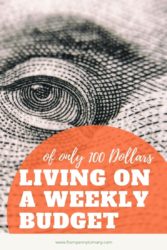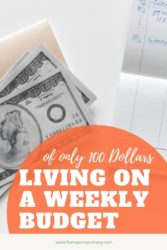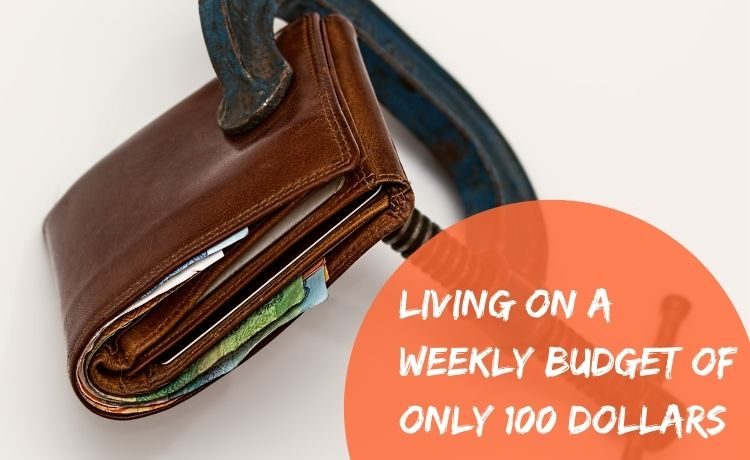One of the best ways to realize your dream is to save enough money and to spend as little as possible on things that are not directly contributing to your dream. Saving costs by minimizing your daily expenses is the way to go if you are looking for a growing bank account. Although this is quite obvious, it can be very hard to actually do it. Temptations are everywhere: cool gadgets, new clothes, and fun things to do on the weekends. The opportunities to spend your money are endless. And let’s be honest: after a long week of working hard, all you want to do is indulge a little bit. You deserve it, right? Or is living on a weekly budget the way to go?
In this blog, we discuss how to live on $100 a weekly budget after bills! Any question? Please leave a comment.

Spending money unconsciously
As human beings, we are surprisingly good at spending a lot of money each month on a lot of different things. We tend to love the convenience of the ‘good life’; eating in restaurants, getting food delivered to the house, going out on the weekends, etc.
Besides, we also spend quite some money on things for the house, groceries, and weekend getaways. For us personally, one of the main money-consuming expenses is going out for dinners and drinks with friends.
Somehow, without having real insight into our expenses the money just automatically finds its way out of our wallets. The process actually often is quite unconscious, which makes it more difficult to save money each month.
Create insight with a weekly budget
A television show actually sparked our idea of a possible solution to unconscious spending. In this tv-show, a team of experts helps people that have gotten themselves into financial problems.
Participants of the show often have a lot of debt and struggle to get a grip of the situation. They might face the threat of a forced sale of their house or they might have stopped opening envelopes because of all bills and payment reminders that are chasing them.
One of the remedies used in the show to teach people to manage their money better is living on a weekly budget. People get a fixed weekly amount of money they can use to cover their expenses during the week. The amount is often somewhere around 100 dollars.
Living on a weekly budget is used to let people get more control over their spending, which grows their insight. Obviously, it also creates a quick way to cut expenses which means more money is left over to pay off the debt.
LIVING ON A WEEKLY BUDGET MINI-WORKSHOP
Excited to try living on a weekly budget yourself? The Weekly Budget Mini-Workshop is the best way to start living on a weekly budget!
During this mini-workshop, you will set your goal, determine your weekly budget amount, and monitor your progress. The workshop is packed with short assignments, templates, and loads of essential tips to make sure you will completely rock working with a weekly budget. After following the workshop, you will have created a new habit of living on a weekly budget.
Want to join? Just leave your email address below and we will send you more information about the mini-workshop!
How we use the weekly budget
We were intrigued by the ease of how people were able to get everything done within their weekly budget, once they started using it.
Since we are always looking for new ways to better manage our finances, we decided to give it a try. We had a good reason to save as much money as possible because we had just signed the contract of our new sailboat and needed to turn every dime to make sure we would be able to pay for the boat at delivery.

Living on a weekly budget
We decided to give it a try and to start living on a weekly budget of 100 Euros, which is around 115 US Dollars.
This was the amount we allowed ourselves to spend during the week on all our variable expenses. This means that our fixed costs were not to be covered by the weekly budget.
Our weekly budget timer runs from Saturday up to and including Friday. We use a separate bank account for our weekly budget and we make sure that each Saturday the amount on it is exactly 100 Euros.
Read the article about setting up your bank accounts for financial success if you want to know more about the structure of our bank accounts.
It is important to realize that we do not add 100 Euros each week. We could, but we decided to make the challenge more interesting.
If we have a budget leftover from the week before, we supplement the remaining amount to 100 Euros again. This means that often we actually are living on a weekly budget that is less money than 100 Euros.
An overview of the categories we use the weekly budget for:
- Weekly groceries
- Pharmacy items
- Going out together (diner, lunch, drinks, cups of coffee)
- Presents for family and mutual friends
- Pet necessities (we have a bunny)
- All other small things we buy for our common household
Things we don’t include:
- All fixed costs (electricity, water, internet, taxes, etc.)
- House maintenance costs (we have a separate account for that)
- Clothing/apparel (we pay for this from our individual bank account)
- Going out with friends individually
- Presents for each other
The benefits of living on a weekly budget
The weekly budget is a way of limiting your expenses by creating scarcity. It obliges you to make choices when it comes to spending your money. This forces you to re-evaluate all the expenses you have and prioritize how important they are.
It also creates a hard money bottom, which means you will stop spending when you run out of your budget. You might postpone the expense to a week later, but this barrier ensures that you make a better decision each time you want to spend money.
To give an insight into the results: before living with a weekly budget, we spend a monthly budget of 750 euros; around 870 USD for a household of two persons. We tried to save 200 Euros from this amount each month, but often we didn’t manage.
After starting living on a weekly budget, we were able to live from 100 Euros per week and almost reduced our variable costs by 50%!
Tips when you start living on a weekly budget
1. Challenge yourself, but not too much
Determine your weekly amount and set it as challenging as possible, but don’t overdo it. The weekly budget should be tight – forcing you to make choices – but you don’t want it to get discouraging. Challenge yourself and have a little bit of fun
2. Variable expenses only
Use the weekly budget on your variable expenses only (groceries, going out, presents, gadgets, and clothes) and leave your fixed costs (mortgage or rent, water, electricity, etc.) out of the equation. Read setting up your bank accounts for financial success for more information about this
3. Choose your amount
Decide which expenses you want your weekly budget to cover and choose and the amount that fits with that. As a couple, we still have our own personal bank accounts to pay for clothing and individual nights out, but if you are living alone or have a different financial set-up as a couple it is important to discuss this
4. Separate bank accounts
You can go to the ATM and get your weekly budget in cash every week, but you can also use a separate bank account. We prefer the latter because it means we both can easily access the budget, but this is of course a personal preference
5. What is your goal?
Make sure you know what your goal is and why you need to live on a weekly budget to achieve this goal. Use the power of the Big Hairy Audacious Goal to help you stay motivated in your journey of cutting expenses and saving costs
6. Be strict!
Be strict in living on a 100 dollars a week budget. If you are not hard on yourself and make excuses and exceptions every time it will NOT work. Living on a weekly budget means you will have to decide not to go to a restaurant this week, but cook a nice homemade meal instead. It’s all about priorities and making choices to reach your goal.
Monthly expense overviews
If you are interested in weekly or monthly expenses you also might want to check out our monthly expense overviews we started publishing since we live full-time on our 42-foot Lagoon catamaran.






4 Comments
Great advice! We need to try it. But to be honest I am wondering how you did to reduce groceries to fit into this amount? We don’t buy expensive food and we often go over this budget just for groceries 😳 but we have only a very small fridge on board and no freezer so not possible to make big groceries in a cheap supermarket. Is that how you manage to fit into that budget?
Hi, yes it really worked well for us! It probably is good to know that we used this approach while we were living in the Netherlands; groceries are fairly cheap there. Also we planned our meals in advance and went to the store only once a week. This really helped keeping costs down. Depending on where you live you might have to raise the weekly amount. And you will get better at it over time. In the beginning we always would ru short, while after a while we often even had money left at the end of the week. You could start with a higher weekly budget and lower it as you go. Remember that it should be challenging, but not impossible. GOOD LUCK! 💪
You have included so many useful suggestions. I am a minimalist so hate wasting food or purchasing unnecessarily, but you have really highlighted some useful points.
Hi Arpita, thank you so much for your feeback. We love to hear that! Great that you are living a minimalistic lifestyle, it has brought us so much! Ronald & Fleur